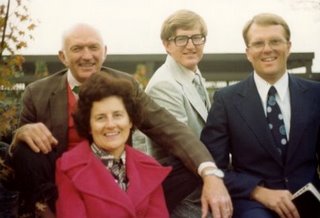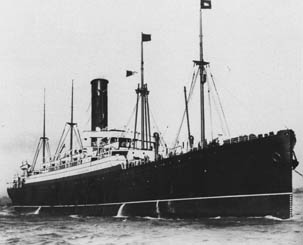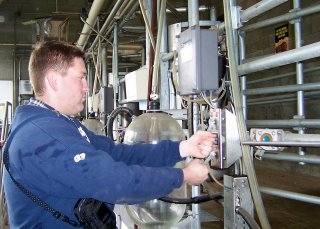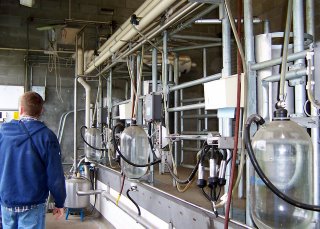Can you name all of these?
Can you name any of these?


Current events, thoughts, and items -- to be shared with my family, and friends. Let us make this BLOG a ZION in the midst of Babylon








 And it came to pass in the 50th year of their marriage, we gathered together for a celebration. Songs, skits, performances, we remembered the best of times. This was the best of times.
And it came to pass in the 50th year of their marriage, we gathered together for a celebration. Songs, skits, performances, we remembered the best of times. This was the best of times.
 I found on www.ancestry.com the immigration record of Albert Edward Hanson. He arrived in Boston Harbor 21 Apr 1904, from Birmingham England. They sailed out of Liverpool England. Upon his arrival he was to travel to the address of 61 South Elm St, Manchester, NH. This immigrator was probably my grandfather Hanson.
I found on www.ancestry.com the immigration record of Albert Edward Hanson. He arrived in Boston Harbor 21 Apr 1904, from Birmingham England. They sailed out of Liverpool England. Upon his arrival he was to travel to the address of 61 South Elm St, Manchester, NH. This immigrator was probably my grandfather Hanson.
![]() owards the very end of the 19th century, the largest Cunard liners were the Campania and Lucania. Both well over 10,000 gross tons, they had ensured Britain’s maritime might by winning the prestigious Blue Riband. However, in 1897, the German shipping company Norddeutscher Lloyd introduced the stunning Kaiser Wilhelm der Grosse who bettered the Atlantic crossing-time speed with approximately half a knot. This was more than the Campania and Lucania could ever manage, and as the British rival White Star were planning the 17,000 gross ton Oceanic, Cunard had to invest in new liners.
owards the very end of the 19th century, the largest Cunard liners were the Campania and Lucania. Both well over 10,000 gross tons, they had ensured Britain’s maritime might by winning the prestigious Blue Riband. However, in 1897, the German shipping company Norddeutscher Lloyd introduced the stunning Kaiser Wilhelm der Grosse who bettered the Atlantic crossing-time speed with approximately half a knot. This was more than the Campania and Lucania could ever manage, and as the British rival White Star were planning the 17,000 gross ton Oceanic, Cunard had to invest in new liners.
The ultimate beat back for Cunard was not to come at once, though. Before aiming for
 |
| The Saxonia, in this picture riding high in the water. |
 |
| A crowded scene from the Saxonia's upper decks. |
The following are some of the most pleasant memories I can recall from my childhood on up to the present of being with mom and dad. Included with my thoughts are my family’s memories as well of their grandma and grandpa. We hope this will add to their joy as they celebrate the monumental milestone of fifty years of marriage.
Some of my earliest recollections go back to Hunter Utah. Probably the best memory as a child, for that time, was when I woke very early for Christmas and of course couldn’t wait to see what was under the tree so I came out to the front room. Mom was working hard to put the final touches on the presents and their presentation. She let me stay and watch and help instead of insisting I go back to bed. She did tell me I should go back but did not make me go. I remember the train set and the stuffed Toucan bird and especially the privilege of being with her as she prepared for Christmas. It was just me with her and she let me break the rules to be there.
There are many memories I have with dad on the farm and many of them were not pleasant at the time of their occurrence but now are treasures I tell with fond recollection. I was always proud when asked to do something new on the farm with dad. He would let me watch the gate to make sure the cows would not get out when he was scraping the pens. Of course I would get board and sometimes the cows would escape.
I remember the corn seeds dad gave me and I started my first garden in the small sand pile by the milk barn. They grew to about six inches tall. I don’t remember what happened to them after that.
I would always be getting into trouble on the farm and I do not remember why but I do remember one punishment was I had to run home following the truck. Why this is a fond memory now I do not know why but I smile to think of it.
Dad put a lot of trust in me for one being as young as I. One day he put me in charge of making sure the electric fence worked and asked me to go over and see if the fence was on by touching it and I went over and touched the fence and was shocked. I turned around and dad was laughing at me but I had done my job and knew the fence was working. I never touched the fence again.
I remember a large family gathering to can corn. It was fun event as we carried corn out of the field and loaded up the back of the flatbed truck. Dad would have us hold out our arms and he would pick the corn and load up the ears in our arms until they reached our faces. It was a long day of husking but lots of people were there and I got to be with cousins and play.
The next stop in memory lane is Logan Utah where I started second grade. Mom and dad were not too big into trick or treating so instead our family made a spook alley in which we all took part. The trick or treat victims come to our front door and would be invited in one at a time. They would walk up a plank and then step off the end of it, which they could not see in the dark and we were dressed up and making spooky noises. Dad would then jump out from behind the door which led to the upstairs. He scared many of the kids. We would then make the kids bob for apples to get their treat which was popcorn balls made by mom. Our house got egged that year because of it.
This is the earliest I remember dad making homemade root beer which he would store in the cellar where the coal furnace was. It had to rest for two weeks before it was ready to drink and he made it in regular canning jars. His first attempts were only successful in making bombs that blew up and root beer was all over the cellar. This was probably not one of mom’s or dads great memories but for a kid it was great that your dad made stuff that exploded.
I have wonderful memories of the Logan Tabernacle and spending time with dad there when he was a tour guide. Not too many people stopped by during our time so dad took lots of naps but when non members did stop to see the Tabernacle, it was my first experience in missionary work and dad taught them about the Church as we showed people around the building.
I was baptized there by him and I have taken my children there and they have seen the font and that building which Grandpa helped paint. It is hard to express the feeling I have when I am there because of my time I had there with dad.
Probably the best time I can recall being with my parents and family in Logan is when we went snow sledding at Uncle Rene’s home in Paradise. There was this big hill that we all went to riding on the trailer behind the tractor and we went down in tube chains and on saucer sleds. My parents were like kids playing in the snow with us.
Another fond memory I have with mom is when we were caught in Sardine canyon in a blizzard and could not get home to Logan. If I remember correctly, she had all of us kids with her and she prayed for us in the car that all would be alright. We spent that night in a motel. I was scared but mom took care of all my fears. I knew she was worried about the snow but I knew all would be alright because she was there and because of her prayer.
We moved to Chowchilla California and root beer production hit its peak. Dad made the best homemade root beer I have ever tasted. Those last bottles of every batch that had reached the three week old stage brought tears to my eyes as the delicious liquid went down so smoothly that every part of my mouth and throat was on fire. I couldn’t get enough of it!
In Chowchilla, dad gave me my first paying job on the dairy at 25 cents per hour. I had never gotten paid before for playing most of the time. I was so proud when mom took me to the bank and opened my first savings account. This blessing led to one of the best Christmases in my recollection. All of the children had money from jobs and we were able to but presents for everyone else. Mom took us shopping and I can’t remember so many presents being under the tree. Under the direction of Raquel we planned to act out the Savior’s birth for mom and dad as a surprise on Christmas Eve. I forget what part I played but I remember Raquel was the donkey and John was Mary. My family still has the tradition started by mom and dad of opening one present at a time and seeing what each other person received.
Dad started taking me to General Priesthood meeting held at the Merced chapel before I was twelve. It was a special time to be with him.
I loved going to town with dad to the dairy store. It was right across from the little hamburger stand that sold large ice cream cones for 10 cents. Lots of times we would get an ice cream cone or a soda, a hires root beer, from the vending machine in the store. People would look at us as if we were strange at the hamburger stand because we were in our work clothes and rubber boots.
One thing I hated to do was crack all the English walnuts we had picked up over the Fall season. It was much more fun when mom or dad pitched in and they bought a lever operated nut cracker to make the job easier.
Dad put in a basketball hoop for us and would sometimes come and shoot his left handed hook shot that would always go in. He would tell us stories of when he played baseball as a kid and would catch the ball with his bare hands. I always loved my parent’s stories of when they were growing up. Mom’s favorite was when she got revenge on Uncle Alan and bit him when he stuck his arm in front of her at the dinner table. It was nice to know they were kids too and hid out in the pea patch to escape work or trouble.
Our dinner table will always be a nice memory especially the Sunday dinners when we would confess things we did in the past and could now laugh about without fear of retribution or punishment. One case in particular was when we were playing in the canal that ran by the school and we were measuring how deep it was. Bryan fell in and I saved his books first then pulled him out. We dried the library book on the air vent and turned it back in to the school library. They accepted it and we did not have to pay for it. Kyle threw his wet clothes in the laundry basket and told mom that he fell in a mud puddle when questioned why his clothes were all wet. It was a kid coup to the greatest degree and we could all now talk and laugh about it around the Sunday dinner table.
Mom wanted me to never fight which was easy because I was the biggest chicken in the world. One day a supposed friend beat me up hitting me in the nose when we got off the bus. I went home and when the boy called up to apologize; mom ripped into him and told him if he ever touched me again I would beat him to a pulp. I know the boy was always more afraid of her then me and I was always thankful he never tried to beat me up again because I did not know if I could hold up my end of mom’s promise to the boy and beat him to a pulp. Mom had never gotten after me in that way ever and I watched and listened to a mother defending one of her young, ready to give her life and I was glad I was not that other boy and that she was my mom.
There had always been a sibling rivalry existing between my younger brother, Bryan and myself that my parents had always tried to fix and change. Sometimes Bryan even got under their skins to the breaking point and even though some may claim I was involved in the causation of the event, it was fun to watch mom lose it with Bryan and chase him around the house swinging a croquet mallet at him. I have never seen either run so fast in my life and the terrified look in Bryan’s eyes as he made several circular dashes through our house in Lodi with mom hot on his heals told me his life was flashing before him. Thanks mom for understanding that sometimes little brothers need to be beaten by some one other than older brothers who have the proper authority to do it. This was probably not one of your finest moments as a parent but it is a fond memory for a boy who was not the target of your righteous indignation.
One of my best and proudest memories is mom being my seminary teacher in Lodi for my sophomore year. I was never embarrassed and accusations made by my peers concerning how I must have cheated because mom was the teacher never bothered me. I learned more that year than any other. I have fond memories of our family reading the Book of Mormon together early before we left for Seminary and dad for work. That would be the second time I finished the Book from cover to cover. Mom always bailed me out on my term papers for school. I would get them written in time to beat the deadline at school but they would need to be typed. She would spend hours late in the evening typing and editing them for me making them better than my rough draft that I had given to her. She was always willing to do that for me. Her only complaint was my procrastination.
Another proud moment for me in Lodi history was when my family showed up for my high school basketball games with the big red top hat and the whole team would start chanting the Addams family theme song from television. I did not care because they were there and I know they loved me. Me teammates would tell me they loved it when my family came to the games.
I enjoyed the personal priesthood interviews I had with dad on the dairy when we were all alone and he would talk of things dear to his heart. He always wanted me to be better than him which I still see as impossible in so many ways. When it came to important things too serious to mention here they would always be ready to listen and never condemn me. I will always be grateful to be referred to as” Ann’s” or “Dewey’s” boy.
It is one of the highest compliments I could ever be given and I hope it is used in the next life as well.
Mom and dad both gave great talks in Church. Mom would go to the podium with her three by five note cards and give a clear concise doctrinal talk which was interesting, easy to listen to and understand. She never smiled much during her presentation but she was calm and deliberate and she never tried to crack a joke that I can remember. Dad would start most of his talks by saying, “You know”. I remember one of his talks he used the analogy on how smart cows were. He always uses a lot of quotes from the brethren and has the quality in which he is able to read something with power and not lose the audience. The most amazing thing about some of dad’s talk was sometimes he could not find the words to finish his thought and would say “you know” and the whole audience would shake their head because they understood. What a gift!
One last special occasion in Lodi was the Paul Ernest Nelson Family reunion at our home. We got to be there because mom and dad were the hosts. I remember the prayer Uncle Rene gave in Sacrament meeting and all the comments that the ward members gave to me because of it. One good brother after priesthood came out and said I had one great family. He said in Priesthood meeting the Nelsons new only one way and it was the right way and they were not afraid to share their opinion about it. What a family!
I love the letters my parents wrote to me while on my mission and have compiled most of them into a book. They contain great words of wisdom, counsel and family history which means so much to me.
These are a few of my fond memories of my past and now a few from my family.
Kari: I remember going over to Grandma and Grandpa's house and you pointing to the G above their house and telling it stood for Grandma and Grandpa and once we arrived at their house we always got the biggest, tightest hug from Grandpa that left our guts squished. Grandma always had something good cooking and we always got a tour of the garden.
I remember going to the closet full of toys and always playing with the Tinker Toys and Grandma would sometimes play with us and show us how to make different things. We also always did puzzles or played dominos with Grandma.
Kyle and I would go out in the garden with Grandpa and he would show us all of his different berries and we would help him pick some, or we would help him pick corn. Often we ended up just playing on the rocks while Grandpa was working. We also would go in Grandpa's workshop and he would show us what he was currently working on.
I remember Grandma used to measure me for the clothes that she would make. I never will forget when she asked me what colors that I wanted for the afghan that she made me and I told her green and white. I have that green and white afghan on my bed at this very moment and to this day it is the warmest blanket that I have. Each Christmas Eve when we are sometimes allowed to open one present, I always want to chose Grandma's and Grandpa's because it's usually always the best, like a warm blanket or something that is just really nice. I have three blankets from Grandma and I use all three of them.
In fourth grade, for Christmas from Grandma and Grandpa I got a teddy bear pin in a little box and I carried it around with me for awhile. I was sure that it brought me good luck and on the day of the tryout for the spelling be I held it in my hand convinced that I would win as long as I held Grandma and Grandpa's present. I didn't win but I still treasured it.
I remember that Grandpa used to show us how he could wiggle his ears and have us try but we couldn't do it. I remember how we used to sit in the living room when we visited and the grownups would talk and we would hear funny stories about Dad as a kid.
Kyle: I love the great meals grandma always fixes when we come and grandpa’s berries.
Scott: I love the scriptures and journal Grandpa and Grandma gave me for my birthdays. It was fun when grandma played Yatzee with me and dad.
Sadie: I will always cherish the pink afghan and the pink blanket grandma made for me. Grandma’s dinners are the best! They are always really good. I like going into grandpa’s shop to see what he was making.
Kenny: I love playing with their games and tinker toys when I come to visit. I like looking at the “Book of Knowledge” they gave to me. I also use the scriptures they gave me for my eighth birthday and going into grandpa’s garden.
Ryan: I like grandpa’s berries and grapes to eat and his back yard. I like playing with their Lincoln logs downstairs. I like the soft white blanket grandma made for me.






